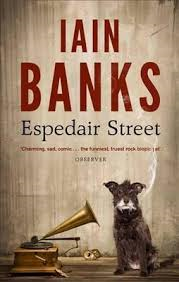The Wasp Factory by Iain Banks

The Wasp Factory was Iain Banks’ first novel. I couldn’t say that I enjoyed this story of a psychopathic teenager who had killed three people by the age of ten, but the story certainly kept me turning the pages.
Frank is sixteen and lives on a remote island with his father. He was bitten in the groin by a dog as a small child and suffered horrible injuries, which may partly explain why he spent his days carrying out bizarre rituals using the heads of dead animals – be warned, this book contains plenty of cruelty towards animals… and reminiscing about how he killed two of his cousin and a younger brother without anyone ever suspecting he had murdered them.
Frank’s birth was never recorded, so he never attended school or mixed with other children – apart from his brothers and cousins and you already know what happened to them… His only social activity was going to the local pub with his friend Jamie, a dwarf. Frank’s father was also reclusive and spent most of his time locked into his study, a room Frank was not allowed to enter. Frank also had a locked room which no one else was allowed into, and this is where he kept his wasp factory, a torturous device he built using a clock face where captured wasps died a particular death depending on which number of the o’clock they crawled into. To further complicate the insight into Frank’s mind, he used the wasp’s ‘chosen’ death style to tell the future.
Frank also had a terrifying array of weapons, both home-made and bought, including catapults, bombs, flame-throwers and an air rifle. It’s probably a wonder there weren’t more unexplained deaths in his community, since he’d almost run out of family.
Frank’s older brother Eric had recently escaped from a mental asylum, phoning occasionally as he made his way back to the island. Eric’s reputation for setting dogs on fire and forcing children to eat maggots and worms was well known to the family’s neighbours.
It goes without saying that The Wasp Factory is a nasty book. I probably wouldn’t have finished it, except that 1. it was short and 2. some parts are funny, in a very black way and 3. I’ve read other books by this author which are very good. If this had been the first book I’d read by Iain Banks, I probably wouldn’t ever have read another, but since it wasn’t, I’ll continue to read through his books chronologically to watch how his style developed.


 I nearly stopped reading The Quarry by Iain Banks after a few chapters because I couldn’t get into the story. I’m not sure why I persevered, but after only a couple more chapters my opinion had reversed, feeling grateful I hadn’t put this book aside.
I nearly stopped reading The Quarry by Iain Banks after a few chapters because I couldn’t get into the story. I’m not sure why I persevered, but after only a couple more chapters my opinion had reversed, feeling grateful I hadn’t put this book aside.
Recent Comments